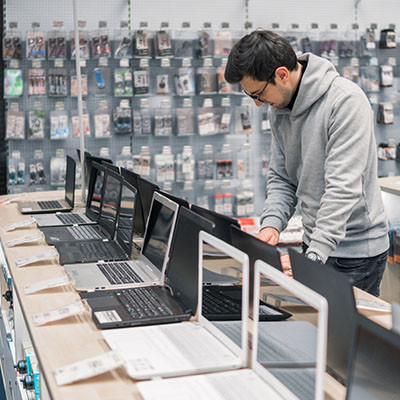
- Home
- About Us
- IT Services
- Understanding IT
- Understanding Shadow IT
- Understanding Your Virtual Identity
- Understanding the Modern Office
- IT Threat Glossary
- Understanding Business Continuity
- Windows Server 2003: End of Life
- Understanding the Internet of Things
- Understanding Network Security
- Understanding SOX
- Understanding BYOD
- Understanding PCI DSS
- Windows XP End of Life
- Understanding HIPAA
- Cloud Computing
- News & Events
- Blog
- Support
- Contact Us
- Register
- Login
Texas Professional IT Services LLC Blog
Expert Tips for Your Next Laptop Purchase
Thanks to our role as a managed service provider, a lot of our time is spent working with the technology commonly found in today’s workplaces. A prime example: the laptop workstation. This has given us a perspective of what laptop qualities are best for business use that you might find helpful as you’re looking to add additional devices to your inventory.
What Specs are Best for a Work Laptop?
Of course, not every member of your team is necessarily going to be using their laptop to do the same things, so there may be a few outliers to consider. However, a good baseline for everyone can essentially be summarized by the following:
- At least an i5 processor
- At least eight (but ideally 16) GB of RAM (Random Access Memory)
- At least 256 GB of SSD-based storage, supplemented by centralized and/or cloud-based storage
Beyond that, most of your other considerations should be determined on a case-to-case basis, largely based on how each employee’s work processes take shape. How often will the laptop be moved around? Does Employee X regularly go out on the road, or do they typically work from the same place in the office, occasionally moving to a secondary location for a meeting? Do they have a hybrid role, meaning that their laptop will frequently move between the office and their living space? More specifically to their individual work processes, how useful will a number pad be to Employee X?
All of these questions—and if we’re being honest, many more—are invaluable to know the answers to, so you can identify the device that is an appropriate size, weight, and form factor for their needs, with sufficient battery life.
Will a Laptop Have a Comparable Lifespan to a Desktop Workstation?
Not that long ago, the answer was a resounding “no.” Nowadays, however, these two devices are much closer in longevity. The determining factor is now largely how much the laptop is handled. When you think about it, once it’s been set up, a desktop workstation really doesn’t move around all that much, whereas the laptop is literally meant to be moved, which inherently means it’s exposed to much more potential abuse. So, while a laptop still won’t last quite as long as you would expect a desktop to last, treating it gently will pay off in terms of its lifespan.
Aren’t Laptops Notoriously More Expensive than Desktops?
Again, this was once very, very much the case, which made it very difficult for businesses to justify laptops for many employees. Nowadays, costs—particularly once you start to consider the top-of-the-line devices—are much closer between comparable laptops and desktops.
Can I Trust the Manufacturer’s Claims Concerning Battery Performance?
Not really, unfortunately. The way a laptop is being used has a major impact on how much power the laptop will go through, as the processor will need to work harder for certain things and requires more power to do so. Any resource-intensive processes or applications will pull more power, so the more time you spend watching videos or editing photos with your device translates to less time your charge will last.
It also should be acknowledged that the estimated battery life the manufacturer provides in no way reflects the average business’ needs. When devices are evaluated by the manufacturer, they skew the results in every way they can: power efficiency settings enabled, of course, but the screen is also effectively turned off with the brightness so low, Wi-Fi and other connections are turned off, there are no external devices connected, and there’s just a page up and refreshing on occasion. We recommend that you just keep the device plugged in, or at the very least, keep the charger handy.
If you’d like advice that’s more exactly tailored to your business’ needs, you can reach out to us and start a conversation. Give us a call at (832) 514-6260 to learn more.
About the author
Texas Professional IT Services LLC has been serving the Baytown area since 1995, providing IT Support such as technical helpdesk support, computer support, and consulting to small and medium-sized businesses.




Comments